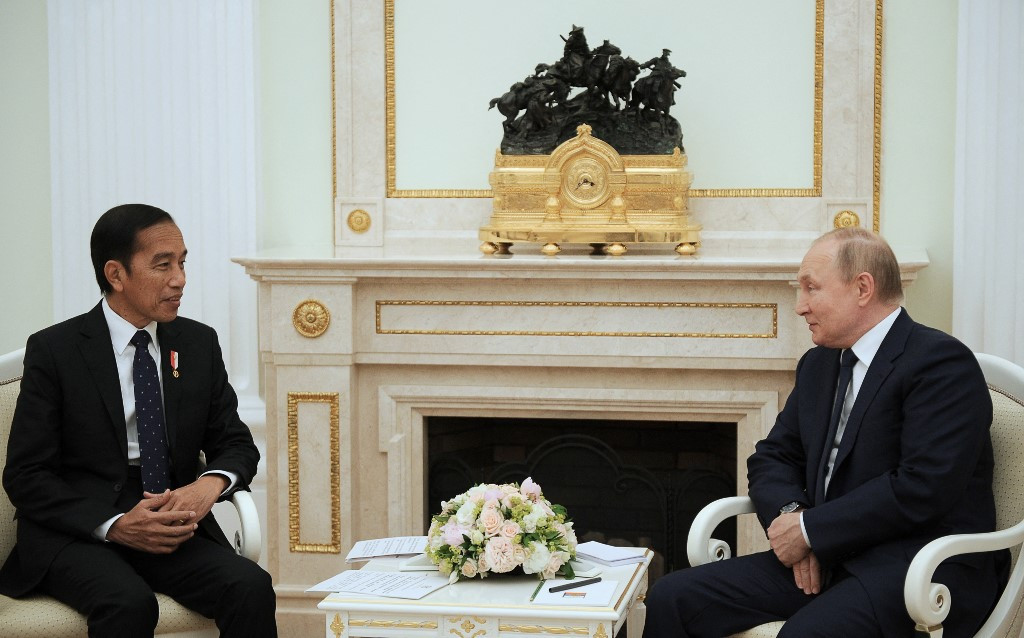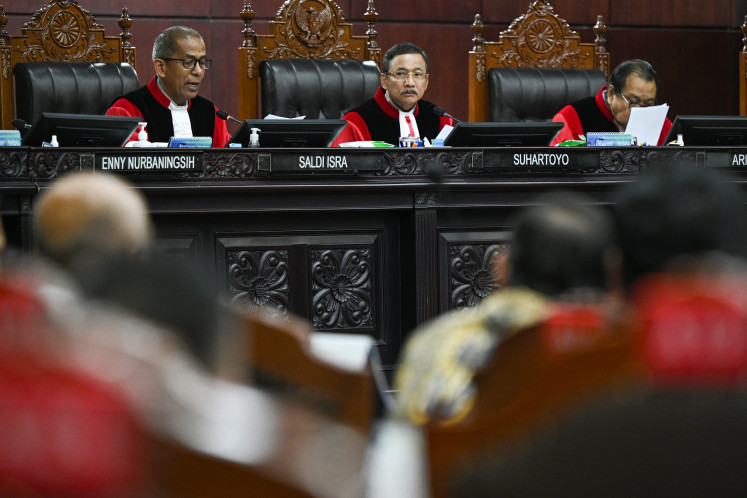Popular Reads
Top Results
Can't find what you're looking for?
View all search resultsPopular Reads
Top Results
Can't find what you're looking for?
View all search resultsIndonesia may need to do more to help broker peace in Ukraine
Experts say country has neutral stance but few bargaining chips to stop war.
Change text size
Gift Premium Articles
to Anyone

While President Joko “Jokowi” Widodo has offered to become a peace mediator between warring Ukraine and Russia, Indonesia might have a more limited role for actual peace to occur, experts say.
The President met with Ukraine’s Volodymir Zelensky and Russia’s Vladimir Putin on Wednesday and Thursday, respectively, in his mission to seek an end to the Russia-Ukraine war, which has caused food shortages and surging commodity prices around the world.
Centre for Strategic and International Studies (CSIS) international relations researcher Waffaa Kharisma said that compared to other figures who had been trying to mediate between Ukraine and Russia, Indonesia was in a relatively better position because of its neutral stance on the war in Ukraine. However, it also meant that Indonesia had few bargaining chips to influence the course of the war.
While Indonesia had established bilateral ties with Ukraine and Russia, they were not the strongest for Indonesia, Waffaa said. For a mediator to succeed, it needs to have a strong relationship with the parties involved to succeed, he underlined.
“Ukraine and Russia do not distrust Indonesia as we don’t have a veiled interest in them,” Waffaa said in a discussion on Friday. “But the sticking points between Ukraine and Russia were out of Indonesia’s control, such as Ukraine's wish for security assurance or Russia’s wish for Crimea to be recognized as a part of Russia.”
After attending the Group of Seven Summit at Schloss Elmau in Germany’s Bavarian Alps on Monday, Jokowi continued his diplomatic tour to Ukraine, being the first Asian leader to visit the country during the ongoing war.
In Kyiv, he offered to relay Zelensky's message to Putin; in Moscow, he offered to be a bridge between the two.
“I have relayed President Zelensky’s message to President Putin, and I have conveyed my readiness to be a communication bridge between the two leaders,” Jokowi said at a joint press conference in Moscow. He did not say what was in the message.
The President added that millions of people, mainly from developing countries, had been impacted by the disruption to the global food supply chain as a result of the Russia-Ukraine conflict.
“Indonesia does not have any interest except wanting for the war to end soon and the global food and fertilizer supply chain to be restored. This is about the livelihoods of hundreds of millions and even billions of people,” Jokowi said.
Speaking alongside Jokowi, Putin denied Russia was blocking Ukrainian grain exports.
"The Ukrainian military has mined the approaches to their ports," he said. "No one prevents them from clearing those mines and we guarantee the safety of shipping grain out of there."
CSIS international relations researcher Andrew Mantong said Jokowi’s mission of peace had followed the precedents set by Indonesia's free and active foreign policy doctrine, as well as previous trips made by Indonesian presidents to zones of conflict as messengers of peace.
Andrew pointed out that in 2019, Jokowi had visited Afghanistan as part of a peace-building mission, while in the 1990s, then-president Soeharto visited Sarajevo during the height of the Bosnian War. Indonesia has also consistently supported Palestinian independence at the United Nations and served as a facilitator to settle conflicts in Southeast Asia.
Jokowi's visit to Europe was notable as it was one of Indonesia’s roles outside Southeast Asia in a conflict between a strong country and a weaker country.
“The location, the asymmetric nature of the conflict and its strategic impacts have driven up expectations of Indonesia’s potential and effectiveness as an alternative in contrast to a stalemate with Europe,” Andrew said.
Three targets
Andrew suggested that Jokowi’s mission targets may be three-tiered. The ultimate goal was to bring about a peaceful resolution to the war, but if that could not be secured, then the second objective was to allow food and fertilizer from Ukraine and Russia to be reintegrated back into the global supply chain.
“It's realistic for us to talk about disrupted supply chains and their impacts as Indonesia’s consistent message; it sounds normative but also rational,” Andrew said.
The last tier would be to ensure that the Group of 20 Summit would proceed smoothly.
“[The G20 presidency] is the power that Indonesia currently has; a convening power that brings big powers to a diplomatic forum through international and regional institutions,” Andrew said.
Moving ahead, Andrew said Indonesia would need to influence other countries to start dialogues with Ukraine and Russia. This could be done on a multilateral basis, as Indonesia currently has such a platform in the G20 presidency and the G20 Summit in Bali in November, he said.










